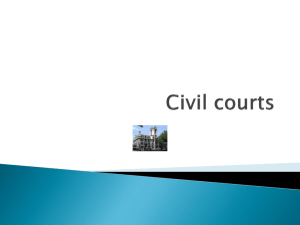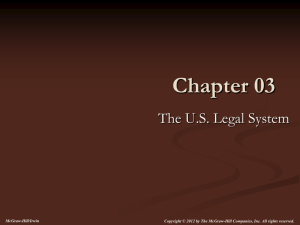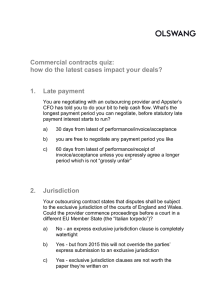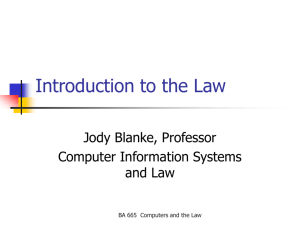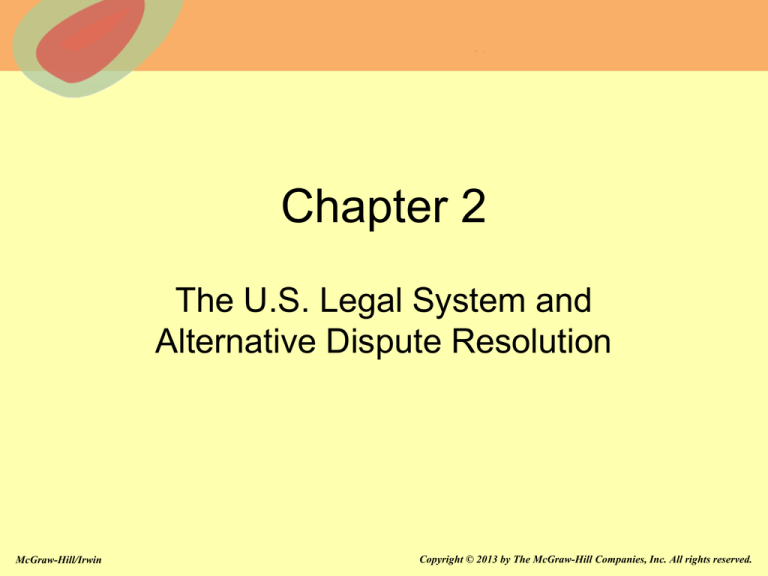
Chapter 2
The U.S. Legal System and
Alternative Dispute Resolution
McGraw-Hill/Irwin
Copyright © 2013 by The McGraw-Hill Companies, Inc. All rights reserved.
Types of Jurisdiction
• Original Jurisdiction:
The power to hear
and decide cases
when they first enter
the legal system
• Appellate Jurisdiction:
The power to review
previous judicial
decisions to
determine whether
trial courts erred in
their decisions
2-2
Types of Jurisdiction
• In personam
jurisdiction: The
power to render a
decision affecting the
rights of the specific
persons before the
court
• Subject-matter
jurisdiction: The
power to hear certain
kinds of cases
2-3
Subject-Matter Jurisdiction:
Exclusive Federal Jurisdiction
•
•
•
•
Admiralty cases
Bankruptcy cases
Federal criminal prosecutions
Cases in which one state sues another
state
• Claims against the United States
• Federal patent, trademark, and copyright
claims
• Other claims involving federal statutes that
specify exclusive federal jurisdiction
2-4
Subject-Matter Jurisdiction:
State Jurisdiction
• All cases not falling under
Exclusive Federal Jurisdiction
2-5
Subject-Matter Jurisdiction:
Concurrent Federal and State
Jurisdiction
• Federal question cases
• Diversity of citizenship cases
2-6
The Federal Court System
• The United States Supreme
Court
• Intermediate Courts of Appeal
• Federal Trial Courts (U.S.
District Courts)
2-7
State Court Systems
• State Supreme Courts
• Intermediate Courts of Appeal
• State Trial Courts
2-8
Threshold Requirements for Litigation
• Standing (to sue)
-Actual/imminent injury in fact
-Injury traceable to actions of defendant
-Injury redressed by favorable decision
• Case or Controversy (Justifiable Controversy)
-Adverse relationship between plaintiff and
defendant
-Actions of one party give rise to legal dispute
-Court decision able to resolve dispute
• Ripeness
-Decision able to affect parties immediately
2-9
Steps in Civil Litigation:
The Pretrial Stage
•
•
•
•
•
•
•
Informal Negotiations
Pleadings
Service of Process
Defendant’s Response
Pretrial Motions
Discovery
Pretrial Conference
2-10
Steps in Civil Litigation:
The Trial
• Jury Selection
• Opening Statements
• Examination of Witnesses and
Presentation of Evidence
• Closing Arguments
• Jury Instructions
2-11
Steps in Civil Litigation:
Post-Trial Motions
• Motion For Judgment In
Accordance With Verdict
• Motion For Judgment
Notwithstanding Verdict
• Motion For New Trial
2-12
Steps in Civil Litigation:
Appellate Procedure
2-13
Appellate Court Decision-Making
Powers
• Affirmation
• Modification
• Reversal
• Remand
2-14
Alternative Dispute Resolution
2-15
Alternative Dispute Resolution
Definition: The resolution of legal disputes
through methods other than litigation, such
as negotiation, mediation, arbitration,
summary jury trials, mini-trials, neutral
case evaluations, and private trials
2-16
Reasons A Business Might Prefer
Alternative Dispute Resolution (ADR)
Versus Litigation
• ADR methods are generally faster and
less expensive than litigation
• Business may wish to avoid uncertainty
associated with a jury decision
• Business may wish to avoid setting
precedent through court decision
• Business may prefer confidential nature
of ADR
2-17
Primary Forms of Alternative
Dispute Resolution
• Negotiation
• Mediation
• Arbitration
2-18
Advantages of Mediation
• Helps disputing parties preserve their
professional relationships
• Provides possibility of finding creative
solutions to dispute
• Offers participants high level of
autonomy
2-19
Disadvantages of Mediation
• Appears to be an equal process and
solution, thereby hiding power imbalances
that would lead to the party with greater
power securing an agreement of greater
benefit
• Some enter mediation with no intention of
finding a solution, and use mediation as a
delay tactic
2-20
Advantages of Arbitration
• More efficient and less expensive than litigation
• Parties have more control over the process of
dispute resolution (parties choose the arbitrator
and determine how formal the process will be)
• Parties can choose arbitrator with expertise in
specific subject matter of dispute
• Arbitrator has greater flexibility in decision-making
(compared to decision-making authority of judge)
2-21
Disadvantages of Arbitration
• As use of arbitration increases, efficiencies and
lower cost advantages (compared to litigation)
decrease
• Difficulty of appealing an arbitration award
• Loss of civil rights and remedies available
through litigation
• Companies and employers may effectively
“hide” their disputes through arbitration (nonpublic nature of arbitration versus public trial)
2-22
Binding Arbitration Clause
Definition: A provision in a contract
mandating that all disputes arising under
a contract must be settled by arbitration
2-23
Other Alternative Dispute
Resolution Methods
•
•
•
•
•
Mediation-Arbitration (“Med-Arb”)
Summary Jury Trial
Mini-Trial
Early Neutral Case Evaluation
Private Trials
2-24


